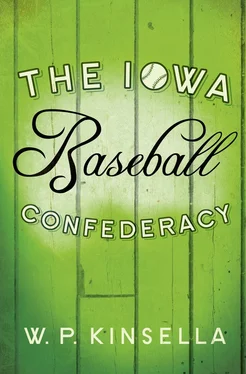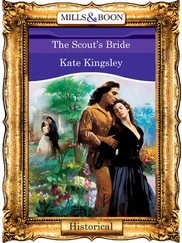My father, Matthew Clarke, dreamed his wife. He lay in his bedroom in the square frame house with green shutters in the Iowa town called Onamata, which, long ago, before the flood, when everything but the church was washed away in the direction of Missouri, was called Big Inning. Wide awake, eyes pressed shut, Matthew Clarke dreamed his ideal woman, conjuring her up from the scarlet blackness beneath his lids, until she rose before him like a genie, wavery, pulsating.
‘There’s always been a strangeness hovering over all this land,’ he used to tell me. ‘Even before I dreamed Maudie, before I learned of the Confederacy, I knew there were layers and layers of history on this land, like a chair with ten coats of enamel. And I sensed some of those layers were peeling off, floating in the air, waiting to be breathed in, soaked up like sunshine. I tell you, Gideon’ – and he would scratch the tip of his long, sun-bronzed nose and run a hand through his black curls, which were as unruly as twitch grass – ‘there are all kinds of mysteries dancing around us like sunbeams, just beyond our finger tips.’ When I’d look at him as if I didn’t quite believe him, he’d go on, ‘They’re there, like birds in a thicket that you can hear but can’t see.’
And I would listen to him and marvel at his energy and dedication, and I’d believe him or at least accept what he told me, but with a total lack of awe. If my father insisted that he alone was in step, the rest of the world a ragtag of shabby marchers, who was I to disagree? Nothing, including the resurrection of the dead, would have surprised me.
My first experience of the floating magic he talked of was when the hollyhocks sang to me. I suppose I was eight the first time I heard those hollyhocks, tall, sturdy flowers the color of sun-faded raspberries. They grew high and physical outside my father’s bedroom window, their stocks like broom handles, saucer-sized heads bowed silently, gathered together like a freshly scrubbed barbershop quartet. ‘Ooooooh, ooooooh, ooooooh,’ they sang at first, softly as a choir.
As I listened I knew they were performing for me alone, that if a playmate appeared he would hear nothing. I remember thinking, Why shouldn’t the hollyhocks sing? And I pictured a nebulous rock wall, desert-rust in color, cracking open like an egg, the tall flowers ducking their heads as they emerged, eerie as aliens. As I sat cross-legged on the lawn in front of them, their song grew louder, the tempo increased: ‘DA da DA da DA DA, DA da DA da da, DA da DA da da, DA da DA DA DA.’ It would be years before I discovered the source of their music.
One thing I don’t understand is that I did not tell my father of the experience. How he would have loved to have had me as an ally. In that credulous way children have of accepting what life offers them, it didn’t occur to me then how lonely my father’s quest must have been. By the time I realized, my mother had long since left us and taken my sister and my cat with her to Chicago. Father was devoting his whole life to proving the existence of the Iowa Baseball Confederacy and having precious little success.
I didn’t understand his obsession well enough to be the kind of son I should have been. Now, years after his death, after he has been dead for more years of my life than he was alive, after I have come to have an obsession of my own, I understand all too well what he went through, and I sympathize, too late though it may be.
But back to my father’s dream. I won’t tell what I know about the Iowa Baseball Confederacy just yet. It is more important to explain about my father and my mother, the woman he dreamed to life.
‘She was so real sometimes, I could smell her and taste her and do everything but touch her,’ he used to say to me. ‘When you get older you’ll understand what it was like, Gid.’ I wonder if all parents tell their children things the children don’t understand but will when they get older. I wanted to understand then .
Matthew Clarke knew he wasn’t likely to find his dream among the residents of Onamata, or even in nearby Iowa City. It was the summer of 1943, the war was raging, and Matthew Clarke was just graduated from the University of Iowa with a degree in American history.
‘I had a choice to make and make quickly,’ he used to say to me. Some of my earliest memories are of hearing this story. We – when we were still a family – used to sit on the wide verandah on humid summer evenings, Mother and Father on slatted wooden chairs, hers enameled white, his vermilion, while my sister and I sat on the floor, our legs in front of us in V shapes, rolling a ball back and forth.
‘It was either the army or graduate school,’ my father would continue. ‘In fact, I had the graduate school application, all filled out, in the back pocket of my pants the night I dreamed your mother to life.’ He’d laugh a low, soft chuckle, and look across at my mother, who would be sitting forward in the white chair, dusky as an Indian, her eyes unfathomable and molasses-black.
I have often imagined Matthew Clarke as he lay on top of the old black-and-red patchwork quilt, which still graces the bed and still looks as if it might at one time have served a Gypsy as a cape, the graduate school application folded and stuffed in his rear pocket, crinkling to remind him of its presence each time he moved slightly.
‘That evening, I was just like a bear gettin’ a whiff of honey, Gideon. I stood up, my arms out in front of me like a sleepwalker, and I headed for the truck, drove off to Iowa City, went to the carnival, and the rest is history.’
That was the short version of the story. The tale became longer and longer, I think in direct proportion to the time my mother was absent from us. As the years passed, my father recalled more and more about that fateful summer night. And as I grew older he supplied more details, and told more and more about what he felt on that magical evening.
After telling the short version, my father would look over at my mother and down at us children and smile. He would wipe imaginary sweat from his high forehead, raise his hands palm up in a gesture of wonder. I would stare at my dark-haired father, at my dusky mother and sister, who would blend into the summery shadows of the porch until I sometimes wondered if they were there at all, and silently question why or how I came to have lank blond hair and eyebrows the color of corn silk.
Matthew Clarke had lived all his life near Iowa City, where sun-blond girls with browning skin and endearing overbites flocked around the campus of the University of Iowa. A few even lived in some of the two dozen houses that made up his home town of Onamata. In the summer of 1943, those sweet, sincere, interchangeable young women wore saddle shoes and pleated skirts. The skirts were made of red, yellow, or green plaid, often with a six-inch safety pin worn just above the knee to keep them modest. Many of these young women were beautiful; most were scrupulously laundered, smelling clean as fresh ironing. They were cheerful, dutiful, God-fearing, and ravenous for husbands. Matthew Clarke wanted none of them.
He knew what he wanted. He had even gone to Chicago in search of her.
‘I ever tell you about the fat woman in Chicago?’ I remember him saying to me. We were on our way to St. Louis to see a Cardinal double-header. It was a Sunday and we’d left Onamata at five A.M. to be sure to get there in time to buy good seats.
‘Fifty times,’ I was tempted to say, but didn’t. I was about fourteen and thought anyone as old as my father must be partially fossilized and fully retarded. But I was cautious. He didn’t wait for an answer from me.
‘Seemed like every street I walked on in downtown Chicago there were women every forty feet or so, posed like statues, in suggestive stances. And there were loud women in the bars I went to, women with quarrelsome voices and stringy hands. But they weren’t the kind I was lookin’ for. Stay away from those kinds of women, Gid. They’re nothin’ but trouble.’
Читать дальше












